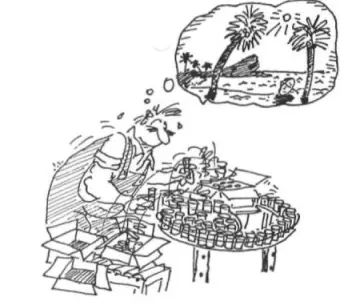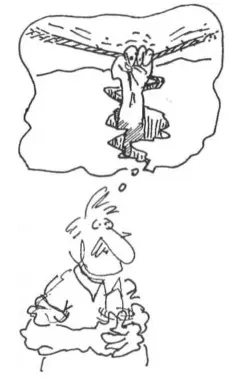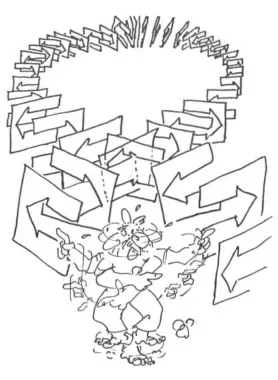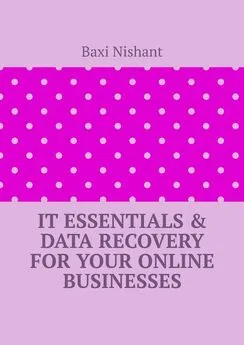Richard Bandler - Using Your Brain —for a CHANGE
- Название:Using Your Brain —for a CHANGE
- Автор:
- Жанр:
- Издательство:Real People Press
- Год:1985
- Город:Moab, Utah
- ISBN:0–911226–26–5
- Рейтинг:
- Избранное:Добавить в избранное
-
Отзывы:
-
Ваша оценка:
Richard Bandler - Using Your Brain —for a CHANGE краткое содержание
Bandler is an innovator and an original thinker in the field of psychology. This book is a transcript of Bandler live in front of an audience, cutting up and cracking jokes as he is prone to do, talking about some of his unique and often practical views on how you can change your feelings, thoughts and behavior. Change is often easier than you think if you use the right method.
Using Your Brain —for a CHANGE - читать онлайн бесплатно полную версию (весь текст целиком)
Интервал:
Закладка:
Suzi: I do something very similar to what Bill's partner does. I tell myself that I can rest for a few more minutes, and I do. But as time passes, my picture of being late gets bigger and closer and brighter. It stays the same picture, but when it's big enough, I have to get out of bed to stop the bad feelings.
Do you procrastinate in other things? (Yes.) How many of the rest of you did term papers at the last minute? The longer you waited, the more motivated you were. Bill's partner has his own internal anxiety generator. Suzi's runs off the clock. They are both very similar in that they use unpleasant feelings as a motivator. Did any of you find an example of motivation that used pleasant feelings — even to do an unpleasant task?
Frank: Yes, Marge pictured all the things she was going to do during the day and felt good about doing them. She said that those pleasant pictures "pulled her out of bed."
What if she only had unpleasant things to do that day? Did you ask her about that?
Frank: Yes, I did. She said she made pictures of those things being all done, and felt wonderful that they were done. That good feeling pulled her out of bed, too. That seemed unreal to me. I can't imagine that actually working, and I wanted to ask you about it.
Where's Marge? . . . Marge, when do you do your taxes? Marge: I have them done by mid–January. It's so nice to have them done, so I can do other things.
Well, it certainly seems to work for her. Nobody enjoys doing taxes, but most people enjoy having them done. The trick is to be able to access that good feeling of having them done ahead of time to get you started. Marge's motivation uses pleasant feelings instead of unpleasant ones. It's less common, and very strange to Frank, who does the opposite.
Lots of people are good at motivating themselves to do pleasant things. They just make pictures of doing the pleasant things, and are so attracted to these pictures that they start doing them. However, that process doesn't work for things you want to have done, but you don't like doing them, If you don't like doing taxes, and you make a picture of doing them, you'll feel repelled. That's not motivating at all. If you want to get motivated positively, you need to think about what's really attractive about a task. If you don't enjoy the task itself, what's attractive is having it done.
Actually there is another piece that needs to be there if Marge's motivation strategy is going to work. How many of you have thought about how nice it will be to have something done, and then you "ran out of gas" when you sat down and started on it?
Marge, when you start on your taxes, what keeps you going?
Marge: All along, I keep thinking about how nice it will be when they're all done.
That's an important piece, but I'll bet you also do something else.
Marge: Well, each time I write down a number or fill in a piece of the form, I feel good about getting that little piece done, too. It's like a little taste of the good feeling I'll have when it's all done.
Right. Those two pieces are what keep you going, and the second one will be more effective than the first. If you just think f it all being done, and it takes some time to finish a project, it can get to seem like "pie in the sky." But that good feeling of accomplishment you get every time you complete a small piece of the task will sustain you through a lot of drudgery.
Marge: That's interesting. It explains a lot of things in my life. People have often called me a "Pollyanna," because I'm always thinking of how good it will be when something unpleasant is over. I always get a lot done, but I've had trouble getting other people to do unpleasant jobs. When I tell them about how nice it will be when it's done, I usually get a blank stare.
Right. They just don't understand. That's not the way they motivate themselves.
Frank: It seems like you're saying that someone can be powerfully and effectively motivated without even having any unpleasant feelings. Is there any hope for the rest of us who propel ourselves with anxiety?
Sure. Like anything else people do, motivation strategies are learned, and you can always learn another one. It's fairly easy to teach you how to use Marge's strategy. But you have to be careful when you make such a pervasive change in someone's life,
Some people make lousy decisions, but since they aren't very motivated, they don't get into much trouble. If you teach them a really effective motivation strategy, they will actually carry out all those bad decisions, and do a lot of stupid, irrelevant, and possibly harmful things. So before I teach someone a powerful new motivation strategy, I make sure that the person already has an effective way of making decisions. If he doesn't, I'll teach him a new decision strategy before I teach him the new motivation strategy.
There are a lot of variations in how people motivate themselves, but we've already got examples of the two major patterns. Most people motivate themselves by thinking about how bad they will feel if they don't do something, and then they move away from that bad feeling. Rat psychologists call this "aversive conditioning."
A few people do the reverse, which is what Marge does. She uses pleasant feelings to move toward what she does want to have happen, instead of away from what she doesn't want to have happen — and she gets reinforcement along the way.
Someone with a motivation strategy like Marge's really lives in an entirely different world than most people — a world without a lot of the anxiety, unpleasantness, and stress that many people experience.
Many people have some combination of the two. They may first think of what will happen if they don't do something, and then think of how nice it will be when it's done.
All motivation strategies work, and you can't knock something that works. However, some of them are a lot faster and more tenacious, and a lot more enjoyable than others.
A lot of the problems that bring people into therapy, or into jail, have to do with motivation. Either they're not motivated to do things they want to do, or other people want them to do, or they are motivated to do things they, or other people, don't want them to do. What we've done here today is explore a little bit about how motivation works, so you can have some control over what you're motivated to do. What we've done here is only the beginning of what we can do with motivation, but it gives you something you can explore more on your own.


VI. Understanding Confusion

Many people get into difficulties because they're confused about something. I'd like to show you how to take confusion and make it into understanding. I need someone to play with, to demonstrate how this is done. After I demonstrate, I'm going to ask you to pair up and do it with each other, so pay attention.
Bill: I'd like to do that.
First think of something you're confused about, and you'd like to understand.
Bill: There are a lot of things I don't understand—
Stop. I want you to listen carefully to what I asked you to do, I did not ask you to think of something you don't understand; I asked you to think of something you're confused about. "Confusion" and "not understanding" are very different. There are a lot of things that you don't understand, because you don't know anything about them. You probably don't understand open–heart surgery or how to design a hydrogen bomb. You're not confused about them; you just don't have the information you'd need to understand how to do those things.
Confusion, however, is always an indication that you're on your way to understanding. Confusion presupposes that you have a lot of data, but it's not yet organized in a way that allows you to understand it. So I want you to think of something you're confused about: something you have a lot of experience with, but it doesn't make sense to you. . . .
Bill: OK. I'm thinking about—
Hold on. You're not allowed to tell me the content of what you're thinking about. You only need content if you are nosy. I'm a mathematician; I'm only interested inform. Besides it's too easy for the rest of these people to get lost in the content. I want them to learn the process that I'm demonstrating.
You've thought of something you're confused about. Now I want you to think of something similar that you understand. When I say similar, I mean that if your confusion is about someone's behavior, have your "understanding" also be about someone's behavior. If your confusion has to do with how a car engine works, make understanding be something mechanical, like how your toaster works, for example.
Bill: I've thought of something I understand.
Now you have two internal experiences; we're calling one of them "understanding" and the other one "confusion." Do they both have pictures?
Bill: Yes.
What I'm interested in are the differences between the two. How do they differ? For instance, one might be a movie and the other a slide. Or one might be in black and white and the other in color. I want you to go inside and examine those two experiences, and then tell me how they're different. . . .
Bill: Confusion is a slide, and it's small. Understanding is a movie, and it's large.
Are there any other differences? If the picture of confusion is smaller, it's probably also farther away.
Bill: Yes, it's farther away.
Do either of them have sound?
Bill: Yes, understanding has a voice describing what I see. Confusion is silent.
How do you know that you're confused about one, but you understand the other one?
Bill: I have different feelings when I look at those two pictures,
OK. How do your feelings know to feel that when you look at those pictures.
Bill: I suppose because I taught it that.
I want you all to notice something. I asked a "How?" question, asking about process, and he answered a "Why?" question. "Because" always answers "Why?" All you'll get out of "Because" is a bunch of historical theory. I only have one theory: that the reason people have so much trouble running their brains is because the Earth is tilted on its axis. So actually you have someone else's brain, and it's mad. That's as much theorizing as I do.
Let's try again. Bill, how do you know to have different feelings when you look at those two different pictures? . . .
Bill: I don't know.
I like that answer.
Bill: After I thought about it, I decided I didn't know.
That happens sometimes. Pretend you know. Talk. The worst thing that can happen is that you can be wrong. Years ago I realized I had been wrong so many times, I decided I'd just go ahead and be wrong in the ways that were more interesting.
Bill: When I look at the understanding picture, I can see how things work. That gives me a soft feeling of relaxation. When I look at the other one, I can't see what's going to happen next; I feel a little tense.
Those certainly sound like quite different experiences. Does anyone have any questions about what I've been doing?
Читать дальшеИнтервал:
Закладка:








